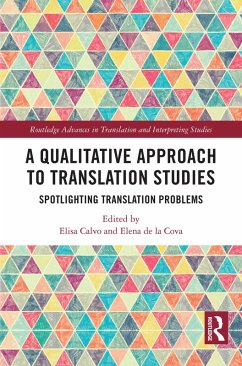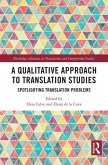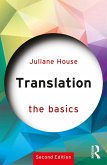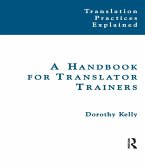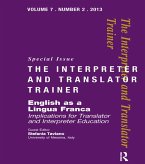A Qualitative Approach to Translation Studies (eBook, PDF)
Spotlighting Translation Problems
Redaktion: Calvo, Elisa; de la Cova, Elena
43,95 €
43,95 €
inkl. MwSt.
Sofort per Download lieferbar

22 °P sammeln
43,95 €
Als Download kaufen

43,95 €
inkl. MwSt.
Sofort per Download lieferbar

22 °P sammeln
Jetzt verschenken
Alle Infos zum eBook verschenken
43,95 €
inkl. MwSt.
Sofort per Download lieferbar
Alle Infos zum eBook verschenken

22 °P sammeln
A Qualitative Approach to Translation Studies (eBook, PDF)
Spotlighting Translation Problems
Redaktion: Calvo, Elisa; de la Cova, Elena
- Format: PDF
- Merkliste
- Auf die Merkliste
- Bewerten Bewerten
- Teilen
- Produkt teilen
- Produkterinnerung
- Produkterinnerung

Bitte loggen Sie sich zunächst in Ihr Kundenkonto ein oder registrieren Sie sich bei
bücher.de, um das eBook-Abo tolino select nutzen zu können.
Hier können Sie sich einloggen
Hier können Sie sich einloggen
Sie sind bereits eingeloggt. Klicken Sie auf 2. tolino select Abo, um fortzufahren.

Bitte loggen Sie sich zunächst in Ihr Kundenkonto ein oder registrieren Sie sich bei bücher.de, um das eBook-Abo tolino select nutzen zu können.
This collection explores innovative or underexploited ways of working qualitatively with what in Translation Studies may be termed as elusive constructs. This book will be of interest to scholars in translation studies.
- Geräte: PC
- mit Kopierschutz
- eBook Hilfe
Andere Kunden interessierten sich auch für
![A Qualitative Approach to Translation Studies (eBook, ePUB) A Qualitative Approach to Translation Studies (eBook, ePUB)]() A Qualitative Approach to Translation Studies (eBook, ePUB)43,95 €
A Qualitative Approach to Translation Studies (eBook, ePUB)43,95 €![Translation: The Basics (eBook, PDF) Translation: The Basics (eBook, PDF)]() Juliane HouseTranslation: The Basics (eBook, PDF)20,95 €
Juliane HouseTranslation: The Basics (eBook, PDF)20,95 €![A Handbook for Translator Trainers (eBook, PDF) A Handbook for Translator Trainers (eBook, PDF)]() Dorothy KellyA Handbook for Translator Trainers (eBook, PDF)33,95 €
Dorothy KellyA Handbook for Translator Trainers (eBook, PDF)33,95 €![English as a Lingua Franca (eBook, PDF) English as a Lingua Franca (eBook, PDF)]() Stefania TavianoEnglish as a Lingua Franca (eBook, PDF)34,95 €
Stefania TavianoEnglish as a Lingua Franca (eBook, PDF)34,95 €![Translation Studies and Ecology (eBook, PDF) Translation Studies and Ecology (eBook, PDF)]() Translation Studies and Ecology (eBook, PDF)43,95 €
Translation Studies and Ecology (eBook, PDF)43,95 €![The Map (eBook, PDF) The Map (eBook, PDF)]() Jenny WilliamsThe Map (eBook, PDF)28,95 €
Jenny WilliamsThe Map (eBook, PDF)28,95 €![Translation as Metaphor (eBook, PDF) Translation as Metaphor (eBook, PDF)]() Rainer GuldinTranslation as Metaphor (eBook, PDF)51,95 €
Rainer GuldinTranslation as Metaphor (eBook, PDF)51,95 €-
-
-
This collection explores innovative or underexploited ways of working qualitatively with what in Translation Studies may be termed as elusive constructs. This book will be of interest to scholars in translation studies.
Hinweis: Dieser Artikel kann nur an eine deutsche Lieferadresse ausgeliefert werden.
Dieser Download kann aus rechtlichen Gründen nur mit Rechnungsadresse in A, B, BG, CY, CZ, D, DK, EW, E, FIN, F, GR, HR, H, IRL, I, LT, L, LR, M, NL, PL, P, R, S, SLO, SK ausgeliefert werden.
Hinweis: Dieser Artikel kann nur an eine deutsche Lieferadresse ausgeliefert werden.
Produktdetails
- Produktdetails
- Verlag: Taylor & Francis eBooks
- Seitenzahl: 318
- Erscheinungstermin: 22. Dezember 2023
- Englisch
- ISBN-13: 9781003806387
- Artikelnr.: 69507289
- Verlag: Taylor & Francis eBooks
- Seitenzahl: 318
- Erscheinungstermin: 22. Dezember 2023
- Englisch
- ISBN-13: 9781003806387
- Artikelnr.: 69507289
- Herstellerkennzeichnung Die Herstellerinformationen sind derzeit nicht verfügbar.
Elisa Calvo is a Senior Lecturer at the Department of Languages and Translation, UPO, Seville, where she co-founded the Interglosia Research Lab (HUM-996) in 2017. She has taught translation and interpreting for over 20 years (UPO, UAX, HWU) and has supervised a number of PhD dissertations at the UPO and the University of Seville. Elena de la Cova is a full time Lecturer at the Department of Languages and Translation, Universidad Pablo de Olavide (Seville), where she co-founded the Interglosia Research Lab (HUM-996) in 2017. She worked as a professional translator for over 16 years and has taught translation and localisation at the UPO since 2010.
List of contributors, Foreword. Christiane Nord, PART I: Concepts and Methods in Problem-Based Translation Research, Chapter 1: Why This Book? Elisa Calvo, Elena de la Cova, Chapter 2: A Functionalist Foundation. Elisa Calvo, Elena de la Cova, Chapter 3: Complex and Elusive Concepts in TS. Elisa Calvo, Elena de la Cova, Chapter 4: Qualitative coding: inducing and deducing. Elisa Calvo, Elena de la Cova, PART II: Real World Studies, Chapter 5: Categorising Problems in Court Translation. A Study of Essential Documents produced in Spanish Criminal Proceedings. Juan-Miguel Ortega-Herráez, Francisco J. Vigier-Moreno, Chapter 6: Categorisation of Translation Problems in University Transcripts. Julia Lobato, Mariana Relinque, Chapter 7: Study of Translation Problems in Superhero and Western Graphic Narratives. Robert Szymyslik, Francisco Rodríguez-Rodríguez, Chapter 8: A Proposal for the Categorisation of Translation Problems Arising from Culturally Marked Translation Units in Children's Literature. Nieves Jiménez-Carra, Inmaculada Mendoza-García, Chapter 9: Spotlighting and Managing Likely Losses of Meaning in Culturally-marked AVT: the Case of Ocho Apellidos Catalanes. Isabel Briales-Bellón, Mª José Rodríguez-Ruíz, Chapter 10: Translation Problems in App Localisation: The Case of Google Home. Elena de la Cova, Jesús Torres del Rey, Chapter 11: Translating the Louvre Abu Dhabi: Tourism Translation Problems in an Arabic-Spanish Corpus. Naima Ilhami, Hanan Saleh Hussein, Chapter 12: Translation of Self-care & Beauty Industry Content. Natividad Aguayo-Arrabal, Lorena Pérez-Macías, Chapter 13: The Extraordinary Nature of Transcreation Problems: The Apple Corpus. Oliver Carreira, Marián Morón, Chapter 14: Translating Psychometric Tests: When Skopos Gets Lost in Literality. Elisa Calvo, Cathy Way, Chapter 15: A Clash with Censorship: Applying a Grounded-Theory Approach to Arturo Barea's La llama. José Enrique García, Yolanda Morató, Chapter 16: Defining the Notion of Interpreting Problem in Multi-party Interactions (IPMI). Estela Martín-Ruel, Carmen Torrella, Chapter 17: Characterising Interpreting Problems in Two Public Service Settings. Eloísa Monteoliva-García, Natalia Rodríguez-Vicente, Chapter 18: Spotlighting Translations Problems Using Qualitative Methodology: Debriefing and Lessons Learnt. Elisa Calvo, Elena de la Cova
List of contributors, Foreword. Christiane Nord, PART I: Concepts and Methods in Problem-Based Translation Research, Chapter 1: Why This Book? Elisa Calvo, Elena de la Cova, Chapter 2: A Functionalist Foundation. Elisa Calvo, Elena de la Cova, Chapter 3: Complex and Elusive Concepts in TS. Elisa Calvo, Elena de la Cova, Chapter 4: Qualitative coding: inducing and deducing. Elisa Calvo, Elena de la Cova, PART II: Real World Studies, Chapter 5: Categorising Problems in Court Translation. A Study of Essential Documents produced in Spanish Criminal Proceedings. Juan-Miguel Ortega-Herráez, Francisco J. Vigier-Moreno, Chapter 6: Categorisation of Translation Problems in University Transcripts. Julia Lobato, Mariana Relinque, Chapter 7: Study of Translation Problems in Superhero and Western Graphic Narratives. Robert Szymyslik, Francisco Rodríguez-Rodríguez, Chapter 8: A Proposal for the Categorisation of Translation Problems Arising from Culturally Marked Translation Units in Children's Literature. Nieves Jiménez-Carra, Inmaculada Mendoza-García, Chapter 9: Spotlighting and Managing Likely Losses of Meaning in Culturally-marked AVT: the Case of Ocho Apellidos Catalanes. Isabel Briales-Bellón, Mª José Rodríguez-Ruíz, Chapter 10: Translation Problems in App Localisation: The Case of Google Home. Elena de la Cova, Jesús Torres del Rey, Chapter 11: Translating the Louvre Abu Dhabi: Tourism Translation Problems in an Arabic-Spanish Corpus. Naima Ilhami, Hanan Saleh Hussein, Chapter 12: Translation of Self-care & Beauty Industry Content. Natividad Aguayo-Arrabal, Lorena Pérez-Macías, Chapter 13: The Extraordinary Nature of Transcreation Problems: The Apple Corpus. Oliver Carreira, Marián Morón, Chapter 14: Translating Psychometric Tests: When Skopos Gets Lost in Literality. Elisa Calvo, Cathy Way, Chapter 15: A Clash with Censorship: Applying a Grounded-Theory Approach to Arturo Barea's La llama. José Enrique García, Yolanda Morató, Chapter 16: Defining the Notion of Interpreting Problem in Multi-party Interactions (IPMI). Estela Martín-Ruel, Carmen Torrella, Chapter 17: Characterising Interpreting Problems in Two Public Service Settings. Eloísa Monteoliva-García, Natalia Rodríguez-Vicente, Chapter 18: Spotlighting Translations Problems Using Qualitative Methodology: Debriefing and Lessons Learnt. Elisa Calvo, Elena de la Cova
